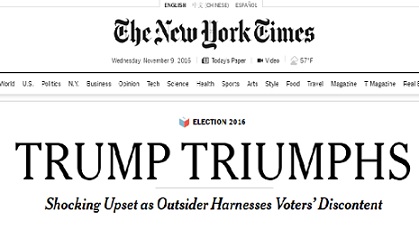What role did the US media play in getting Donald Trump elected?

This is not a sentence that I will write very often: Michael Gove was right. The public are sick of experts.
Latest evidence, clearly, is Trump’s stunning electoral victory – despite every expert telling the US public that he was unfit for office. Earlier evidence of the public’s growing distaste for experts came in the form of the Brexit vote and, from a different direction, Jeremy Corbyn’s double-header victories, both against the grain of ‘right-thinking people’.
Whatever you think of these events, they are all indicative of the same sense of anger and distrust. Anger with the political classes and distrust of the ‘mainstream media’, which is seen to carry their voices and echo the consensus.
So, people are bypassing mainstream media altogether.
According to an excellent Radio 4 documentary last week (The Unswayables), 36m people in the US now get their news first from the swathe of shock jocks that litter the airwaves. In an earlier blog, I mentioned the sterilising effect of Ofcom’s ‘balance’ requirements in this country – but the disconcerting vision of the US broadcast landscape post the abolition of the Fairness Doctrine in 1987 should give us pause for thought. There were not a lot of shock jocks beating the drum for moderation. And Fox News, though lukewarm on Trump, was visceral in its hatred of Clinton.
On the flipside was a much-derided ‘liberal media’ (of both left and right) that took a technocratic approach, that Clinton was ‘obviously’ the sensible, pragmatic choice, and would win out for that reason. It was the same with Brexit, and a lot of voters didn’t share that opinion. It’s one reason why criticism of ‘elites’ held such resonance.
Meanwhile the US print media was its usual austere self, where balance is ingrained and – rightly – editorials highly considered. Take the superlative editorial of USA Today, which has never expressed a preference for a presidential candidate. For the first time in their history, they broke the taboo and declared against Trump.
In a reverse image of the UK, then, the US has a painfully balanced print media – too timid to really shout out what they really believe in their bones – with a broadcast landscape where all bets are off.* There are exceptions to the rules (many of the national broadcasters, such as NBC, impose their own balance requirements to almost obsessive levels) but the caricature stands up.
Then you add in the echo chamber that is social media – where people only subscribe to people they are pre-disposed to agree with – and you get dangerously divided communities who are never exposed to other people’s views or (whisper it) the objective facts.
We live in an era of post-truth politics, we are told: we have a Brexit vote founded on a demonstrable lie (£350m a week to the EU), and now a president who – according to the Economist – lied in pretty much every stump speech he made. But people either didn’t care or didn’t hear.
And that presents very uncomfortable challenges for the media industry.
(*If we are congratulating ourselves on our own restraint, I would recommend opening Private Eye 1431 this week, where the Daily Mail’s ‘Enemies of the People‘ headline aimed at the Brexit judges is quite rightly put in the context of speeches by Lenin, Hitler and Mao. For someone like me, who lived in Zimbabwe, media hate speech against the judiciary has chilling precedents. The government’s lack of condemnation of those headlines was equally concerning.)